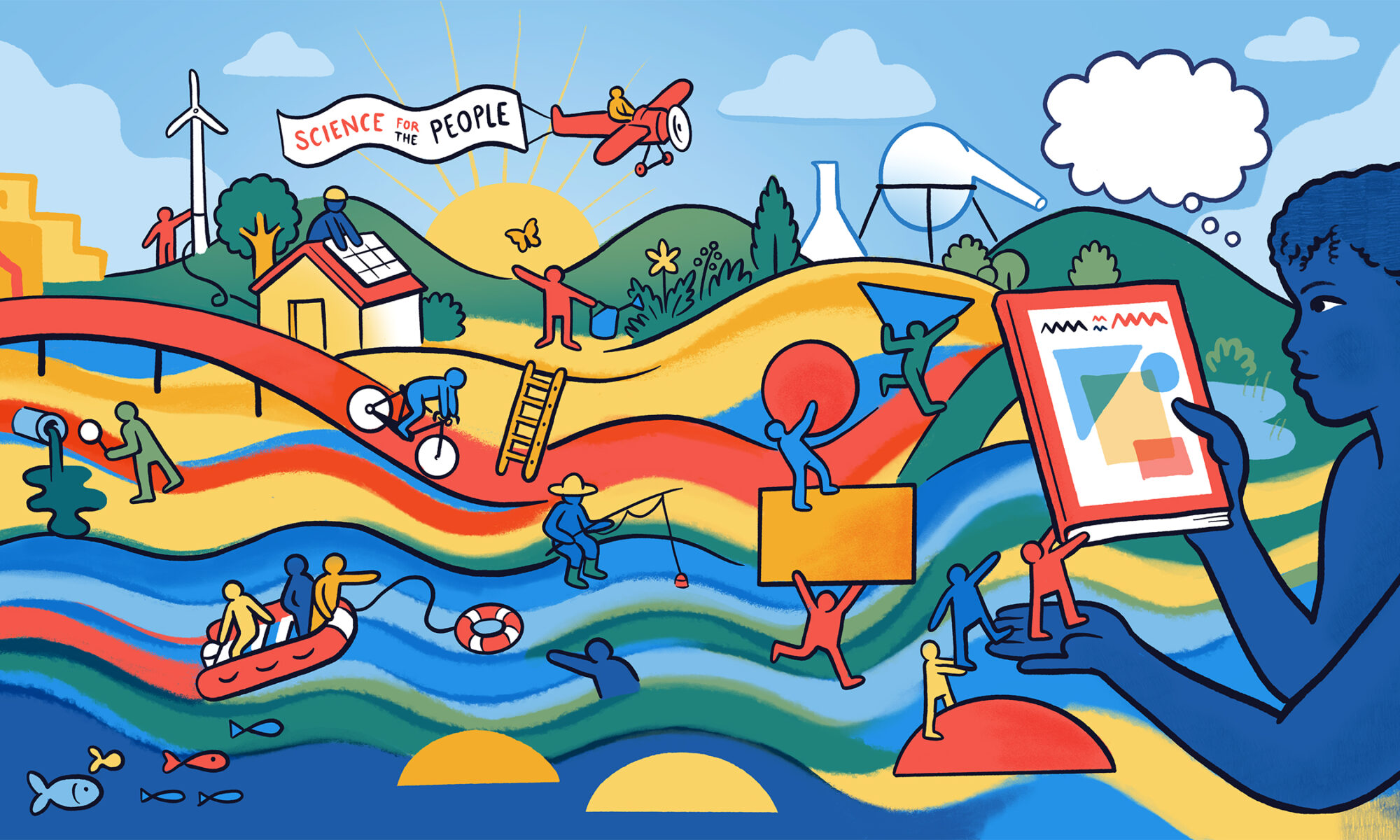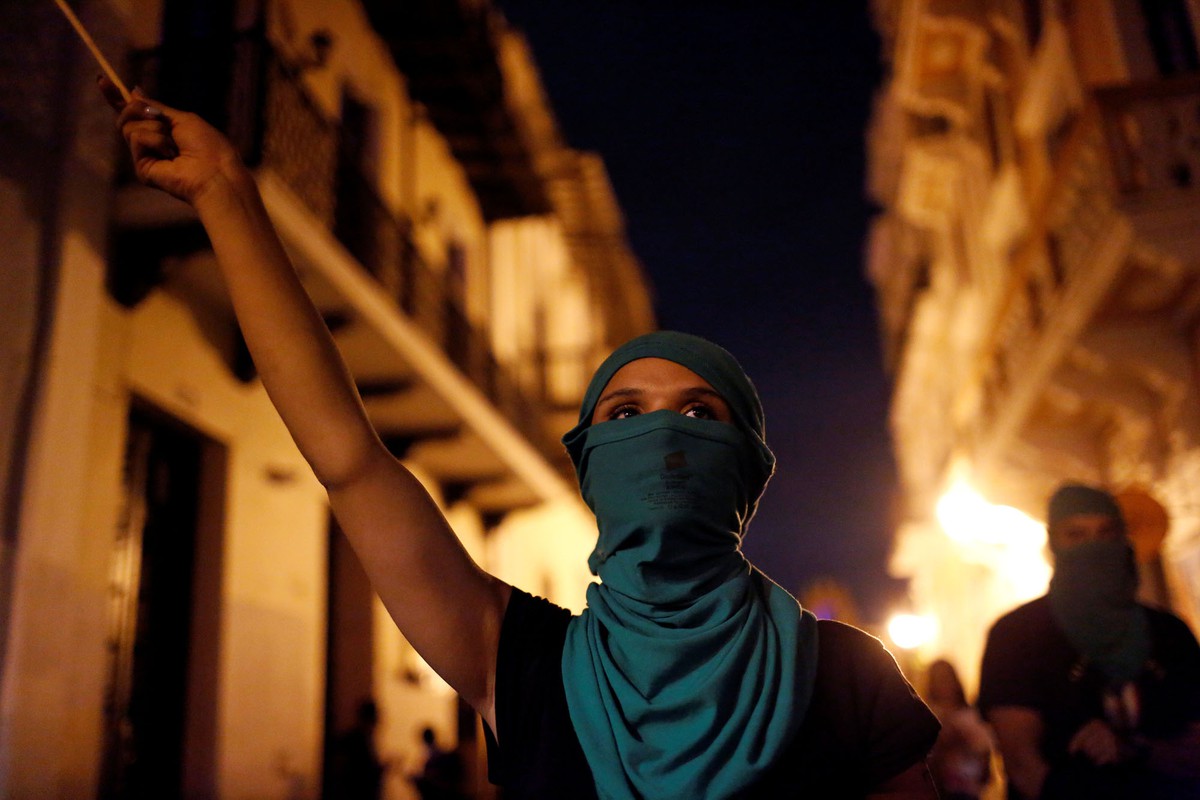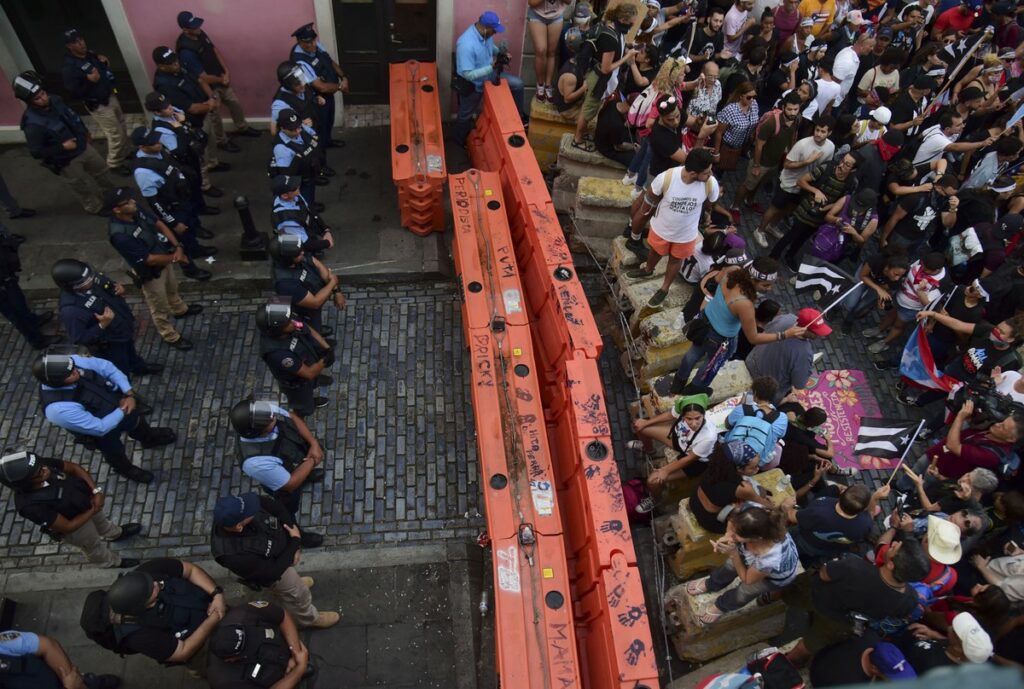
In Part I of the interview, JunteGente organizers Bernat Tort and JuanCarlos “Juanqui” Rivera Ramos discussed the motivations, factors, and historical context for the Puerto Rico uprising with SftP member Lala Peñaranda. We examined the different demands following Ricky’s July 24th resignation announcement and looked at the movement’s conscious decision to step back from the status question.
JunteGente and other initiatives support demands which include: auditing the debt, declaring a gender-based violence state of emergency, the resignation of Wanda Vasquez, strengthening unions, guaranteeing job security, releasing all those previously arrested for political protests, considering climate debt, electoral reform, restitution of stolen public funds, criminally prosecuting corrupt officials, and the creation of popular assemblies. While sobering, Juanqui and Bernat reminded us that the hardest organizing is still to come.
Part II of the interview covers climate justice, the role of unions, Arab Spring reflections, and openings for international solidarity.
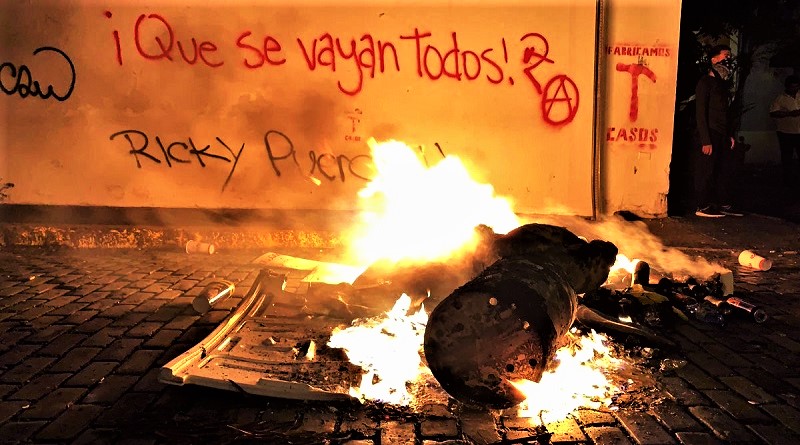
Science for the People: It’s been over a week since Ricky Rosselló announced he would resign. In that time, Wanda Vásquez has proclaimed she doesn’t “want” to replace Rosselló, in what can only be described as a recognition of the movement’s power. With your Arab Spring reflections in mind, what has the past week looked like politically?
Juanqui: Well, the challenge is for this not to become a “seasonal change” but an epochal change, and since the spring is turning into summer… The PNP is fighting among itself for the leftovers of power. In the meantime, several asambleas auto-convocadas (self-organized assemblies) have been happening and organizing around the Island-archipelago.
Whatever happens in the next hours (which is a “mystery” for everyone), needs to have its contrary in the street and in the organization of the people. We (progressive and Left forces) are now in an aggressive organizing phase while simultaneously trying to keep the protests in the street and analysing the situation as we go… Difficult yet hopeful times indeed. There is a possibility that things could take a turn for the worse in terms of who holds power—but not in terms of broadening the radicalization of the public sphere and of organizing efforts.
Science for the People: By all estimates, Puerto Rico will continue to experience increasingly polarized climate patterns. What role has climate change occupied in the uprising’s political discussions?
Juanqui: The political situation hasn’t allowed us to talk about it as much, but we need to tackle this planetary struggle. In the Caribbean, hurricanes, floods, and droughts are going to be stronger and we are going to continue living with them. The issue of climate debt has to be brought to the struggle. Yes, that implies the relationship with the US but how can we begin to weigh in on different struggles in the US? How can we radicalize the idea of the Green New Deal, including what it means for Puerto Rico? The Green New Deal is going to impact Puerto Rico so how we guarantee we have a say in how it plays out?
And then there’s the important issue of our relationship to the diaspora. Because we have been through so much. We are 8.5 million Puerto Ricans in the world but only 3 million in the island archipelago. How do we keep that relationship going? That’s one of the reasons we went to the Socialism Conference in Chicago and to meet with Rossana Rodríguez Sanchez [alderwoman in Chicago’s 33rd ward].
Bernat: There are real organizing challenges here. The demands have been very simple: Ricky Resign, end the Junta, etc. But when you enter the topic of climate change and climate justice, it’s a very complex discussion even just to distinguish: should Puerto Rico care about climate change? On the one hand, even if Puerto Rico went 100 percent green tomorrow, it would have no effect on tomorrow’s global greenhouse gas emissions. We wouldn’t be able to contribute to the conversation in that sense. We don’t sit at the table in any of the G8 meetings, of course, and we don’t have the international power to strike deals for green energy, etc.
On the other hand, we are suffering the effects of the consumption of the First World, the industrial corporations, and the military complex. So we should turn our gears towards demands for a Just Transition. We need to train workers for new sectors and stop pushing for tourism given our coast will be increasingly flooded– and because in the near future, it’s just not a sustainable industry anyhow for Puerto Rico. It’s a hard conversation to have.
Science for the People: We agree that if the US is going to pass a Green New Deal, Left forces must seriously consider its international dimensions, including Puerto Rico and beyond. I know you’re still thinking through these complex topics, but what would you say are some of the demands coming from Puerto Rico for a Green New Deal? What should organizations like ours be pushing for within a People’s Green New Deal regarding Puerto Rico?
Juanqui: In JunteGente, we have different sorts of working groups. Currently one of them is organizing an international meeting around climate change. Those encounters are intended to gather people- from farmers, pescadores, scientists- to listen to each other, collect information and based on that, JuneGente can develop a platform. So I don’t feel comfortable saying ‘this is what we want” because we haven’t had that meeting yet.
Bernat: Our political logic is that we gather the people who actually do the agroecological and environmental work and ask them- have a convening- to collectively set the agenda.
Juanqui: But to answer your question, in general we need support around Just Transition, climate debt, the debt crisis. I mean, The colonial process and the transformation of Puerto Rico has been imposed by a US-focused development. So naturally, our ecological issues are directly related to that. In the past we’ve had the sudden transformation of a diverse archipelago to a sugar monoculture with ecological devastation. Add to that the imposition of the US suburbanization and urbanization models. The car model is the main form of transportation. Puerto Rico has one of the largest concentrations of roads and motor vehicles, and the urban sprawl is just insane. These are all US models. Fordism transformed our landscape. I mention all this because, yes, there is an ecological and climate debt that we have to talk about regarding the US. But these are just general notions.
Science for the People: You are organizing a conference. Can you tell us a little bit about it and why people should attend? [We will link to the conference site here as soon as it goes up.]
Juanqui: Yes, we are trying to bring together social movements, community organizations, scientists, people in public policy, and other sectors to reflect on our planetary crisis but specifically within the context of the Caribbean and Puerto Rico in terms of political ecology, of bringing the political dimension to the ecological reality. Two JunteGente members are leading the organizing of the two-day conference.
We think that we are in a different country. I mean, as Lenin said, there are decades where nothing happens and weeks where decades occur. These two weeks have been decades and decades of happenings. We are in a different country and I think this conference is important given the current political juncture. We want to take advantage of the fact that perhaps we can inspire other people to rise up, reflect, and mobilize. Hopefully in the US as well, because Trump is an embodiment of these chats.
Bernat: He’s a walking chat.
Juanqui: I think people in the US can also rise up and get inspired by the “colony down here”.
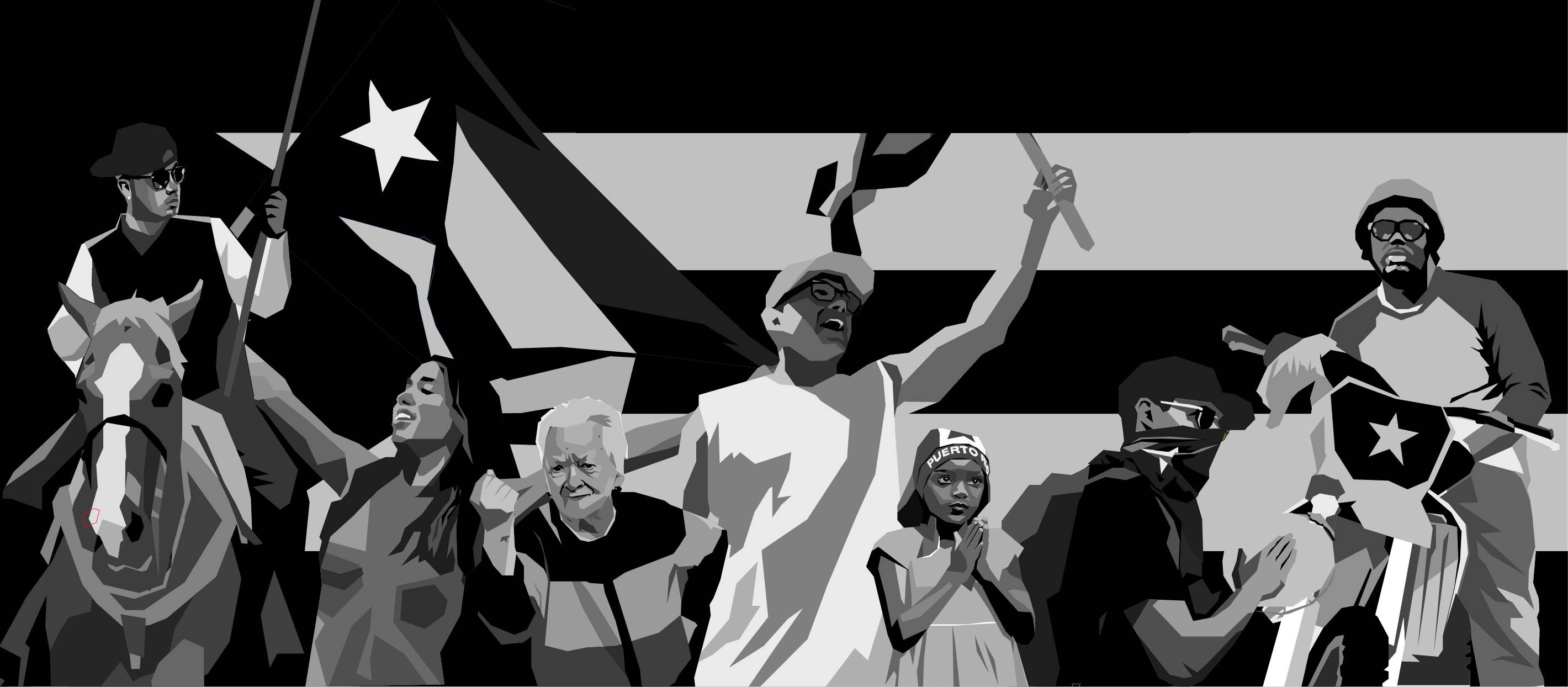
Science for the People: Definitely. I got chills with your mention of asambleas populares and the state of emergency against gender-based violence. A recent NACLA piece argued that these protests are quite literally about life and death, as you have mentioned. Quoting the article, “the rhetoric and attitudes of the Governor and his closest allies captured in the chat are ones that promote harm and death in a number of ways, from the outright incitement of violence to the promotion of a neoliberal politics of deadly neglect.” What does the “deadly neglect” of neoliberal politics mean to you?
Bernat: One of the things I find most striking, a catalyzing factor in people showing up, is not only the blatant disregard for Puerto Rican life and well-being but the actual ineptitude and neglect for governance. The administration has neither the capacity nor the inclination, nor the vocation for governance. It makes you– I say this very cautiously– it almost makes you yearn for decent right-wing people.
Juanqui: Oh shit—
Bernat: But you know what I’m saying. They would govern in a direction I disagree with and they would have a different view of what society should be but at least it’s a political debate. This is like blatant egoistic greed. Regarding “deadly neglect,” I would stress that, yes, they took on a task without being up to the challenge but the worst part (though hopeful) is knowing that literally anyone could do a better job. If we learn something from the chat, it is that anyone can govern, that we can govern ourselves. If these were the people who were supposedly the experts on governance, then we know that we can do it, that anyone can do it. Pick someone at random and say, “what do you think should be the direction in which we should administer the Puerto Rican well-being?” —and anyone would do a better job.
Juanqui: In Puerto Rico at least, the government is an institution to hire, contract, and accumulate a maximum profit. These people are thinking as a group- not even a company, “how can we get rich?” These wealthy families are casta criolla [homegrown caste] but they’re also just the natural product this logic– in a colonial framework. It’s a competition for who gets the money: the gringo or the criollo.
Bernat: The neoliberal state has deteriorated or made almost extinct an entire class of public servant experts. There were career public servants who knew the nooks and crannies of how things got done. And suddenly we don’t have that in our utilities. That puts the government in a position of hiring”experts” who do not have public service as their goal, but just profit.
Science for the People: One of the counterforces to this rampant privatization have been the unions. What role have the unions played in the uprising?
Juanqui: First, a little context. Since at least the late 1990s after the Telefonica Strike in 1997-98, unions became really fragmented and lost a lot of power under neoliberalism. This is partly why unions have not been a big organizing force. This is not to say that there aren’t militant unions active in today’s processes. Militant unions like UTIER and others have been involved in the mobilizations and in resisting utilities privatization. They have contributed to the moment with their knowledge on the logistics of marching in massive numbers. They have also offered their offices to different movements so we can have our political meetings, reflect on what’s happening, and organize actions.
Bernat: There have been unions in the meetings and on the streets. As we mentioned, one of the demands of the mobilizations was to repeal the new labor reform, strengthen unions, and fight for job security. Something beautiful that would have happened on Monday [had Ricky not announced his resignation] – is that the union of truckers, instead of simply going on strike, put out a public statement saying “we are going to have a meeting to propose a strike but we want to know that the Puerto Rican public are ready to withstand the effects, the consequences of our striking, because if we strike there won’t be gas in the stations, there won’t be food in the stores, nor basic medicine in pharmacies. This was planned to be an indefinite strike to pressure Ricky. So they did a democratic social media referendum and people were saying, “yeah, of course, let’s do it, we are ready.” It was one of the most beautiful demonstrations of participatory democracy.
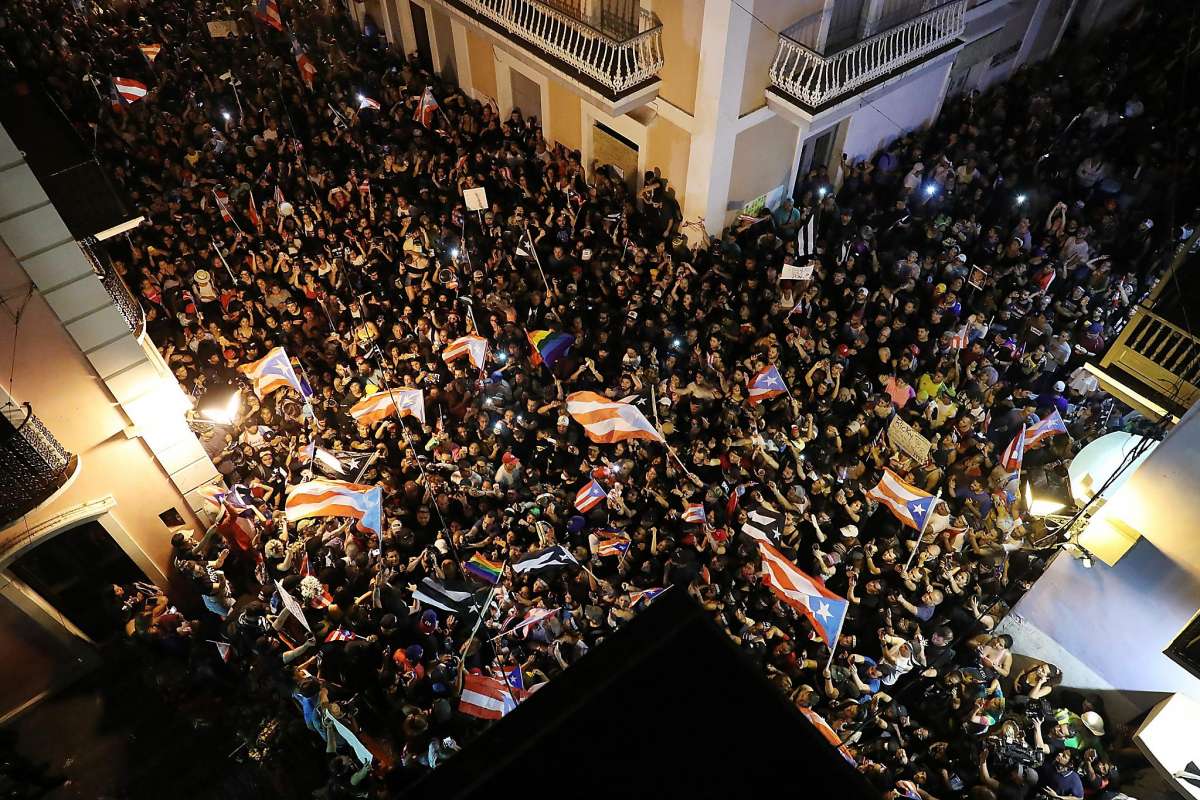
Science for the People: Let’s talk about the Right. What has been its response to the uprising and to Ricky’s resignation?
Juanqui: You have a very wealthy elite of criollos that really don’t know shit about el pueblo in Puerto Rico; and yet they make all the decisions, living in their own class bubble. At this time yesterday even the most conservative, pro-capitalist organizations, were like “ok, Ricky Renuncia” because we were affecting them. All the biggest malls in Puerto Rico, which are part of the political party of the governor, agreed he had to step down. The malls closed today and in previous days. Those are millions of dollars that they lost. So the economic pressure was real.
Bernat: There is something peculiar about this context though. Some people are referring to the chats as “the David Sanes of the uprising”. David Sanes was a Puerto Rican employee of the US Navy who was killed in one of the bombing practices in Vieques. His death was the catalyzing agent for the struggle to close the Navy Base in Vieques. People are calling these chats the David Sanes – i.e. the catalyzing agent- of the uprising. But there is a peculiarity. As soon as Sanes was killed, it was the organized Left that led the struggle to close the base. They were a very ecumenical, rigorous, and extremely organized part of the Left.
But in this case, an FBI intervention was among the catalyzing events. The FBI arrested Julia Keleher, the now-former Secretary of Education and five other people [on charges of steering federal money to politically connected and unqualified contractors]. So we have to be cautious because the catalytic agents were from the Right, from the colonial powers. On one side we have the FBI arrests and on the other, we have the leaked chats which came from inside the ruling party. The latter was a political fight that got blown out of proportion— I’m sure they didn’t intend for this to play out the way it did. Right now, the Party is rumbling. Right now I’m sure they’re lamenting having put that out. Those two occurrences provide context for the struggle.
Now that we have the struggle, how is the Right going to react? The sad part is that they don’t have to mobilize much for their agenda to work because Wanda Vasquéz is going to replace Ricky as interim Governor, Wanda has already been singled out for having done illegal contracts, etc. So they already put in place another corrupt figure. So she won’t change much. The sad part is that the Right doesn’t have to do that much to gain control of the political opening. That’s why we have to continue fighting and struggling.
Juanqui: Yea, this plays well for the US Right. A part of our challenge is precisely to show, bring forward, that Trump and Ricardo Rosselló are the same in their hatred towards poor people, black people, women, all sorts of minorities, immigrants, etc, etc. This is part of the struggle: how can we unite #RickyRenuncia, #TrumpRenuncia? One sector of the Right will want a stronger Junta, with an expansion of IMF-type neoliberal policies around Puerto Rico. Some rich Puerto Ricans will benefit from that. There is another sector of the Right that wants their own sphere of autonomy over the economy. In that context, how do we move the conversation towards more radical democracy? That’s one of our great tasks.
Science for the People: Some people have called the recent uprising in Puerto Rico, the Puertorrican Summer, making a direct comparison with the Arab Spring. Do you agree with this assessment, that implies desires for longterm regime change in Puerto Rico?
Bernat: Not only are we honored as a country by the analogy, because honestly Tahrir Square and everything that happened in the Arab Spring was inspiring to us but also because that was the first thing that popped into our minds as soon as the protests started saying “Ricky Reununcia” we said: “Ok, what happened after Mubarak? Nothing” That was very present in people’s minds.
The day after they got Mubarak out, the military and the Muslim Brotherhood took the better part of the political moment and there was no real or radical regime change. If you go to Spain, and the Occupy Movement, what they have in common is that since the Arab Spring we’ve been very good at appearing in masses everywhere, coming out hardcore in multitudes. But then there has to be a program of political organizing after the fact, after the protests, and we have to be ready for the next step of radicalizing, for the next step of political organizing in the direction of true participatory democracy.
So this is what we’re going to see from today onwards: if we’re going to stay at that level of the Arab Spring or if we are going to take it to the next level or what we think should be the next steps in the international people’s struggles.
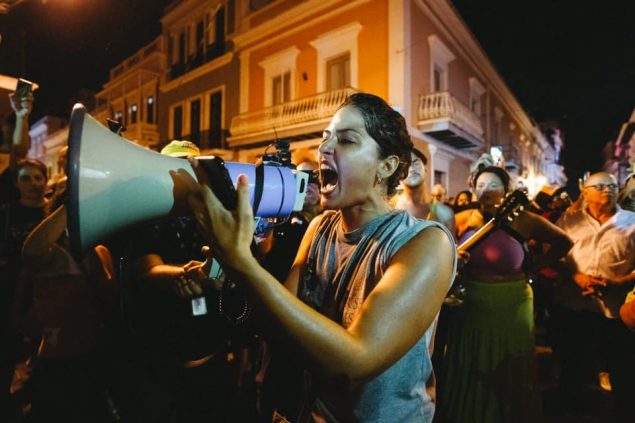
Science for the People: With that in mind, what are some immediate next steps?
Juanqui: We are calling for immediate extraordinary elections outside of the old electoral system. We mentioned some of the electoral reform demands.
Bernat: It would be very interesting if the different sectors that have been protesting could sit at the table and, for example, with Victoria Ciudadana and actually negotiate. OK, we’re going to back you up. But not to cross our arms and say “okay, let’s see what you do”. No, the basis is to continue mobilizing. The power of the people that we have seen through the demonstrations is what sparked the idea for the assemblies. So if have enough feedback from what people want, you can sit down and say “OK, we’ll back you up but these are the demands we have”. That is the most actionable scenario that I see right now because of the way things are set. Not joining a party but putting our demands with a party who would have the possibility of gaining the support of the people who have been manifesting.
Science for the People: Do you have any advice to US-based organizations like Science for the People who stand in solidarity with the Puerto Rican protests and struggle on how to best support the efforts following Ricky’s resignation?
Juanqui: It’s important to recognize the victory. We have to understand that this is not a revolution in the sense of a radical transformation of the system but it is a revolution in the sense of the people changing at least their ways of recognizing their power.
Bernat: the political zeitgeist has changed.
Juanqui: That’s powerful. For me, the topic of solidarity is crucial and beautiful. One thing is to maintain the presence of Puerto Rico in the reflections that you have- political reflections and beyond. La importancia de mantener nuestra presencia en la ecuación. The other expression of effective solidarity is to also rise up and struggle against your own oppressions in the US against ICE, against Trump, against xenophobia, racism, and misogyny. Wherever you are, join the struggles there. Let’s ensure we continue to see the connections between Puerto Rico and all other struggles. So, those two things: keep us alive in your conversations and be a part of the struggle against your oppressors– which are our same oppressors.
Bernat: And I would not hesitate to call this an international movement in the sense that you mentioned the Arab Spring. For example, the feminist movement that we were inspired by Argentina and Spain, we’re in an international movement, we need to solidify those points. This is internationalism at work: we have to own that, we have to believe that it is an international movement. These are not just separate accidental international struggles. This is a global fight against neoliberalism, against capitalism, and against a process that denies climate change and denies that we need to mobilize now to transform in order to save the habitability of our planet.
Juanqui: What Bernat says is crucial. I mean, yes, there is a particular political and colonial context for Puerto Rico but this is also a global struggle for radical democracy. That’s why we talk about the Arab Spring, the Puerto Rican Summer with a Caribbean taste and whatnot but this is a struggle for radical democracy and it should be everywhere. Cause otherwise—they will keep winning and nobody will be safe.
The good news is we have the momentum. People have the power. This is democracy in practice. This is sovereignty in practice. This is decolonization in practice because, at the end of the day, colonialism is also about not identifying yourself as a human being capable of transforming the world, right? So if you’re a colonial subject you think you cannot change the world, etc. But here we as a people we toppled a fucking government. So hey, we can do this. This is self-determination.
